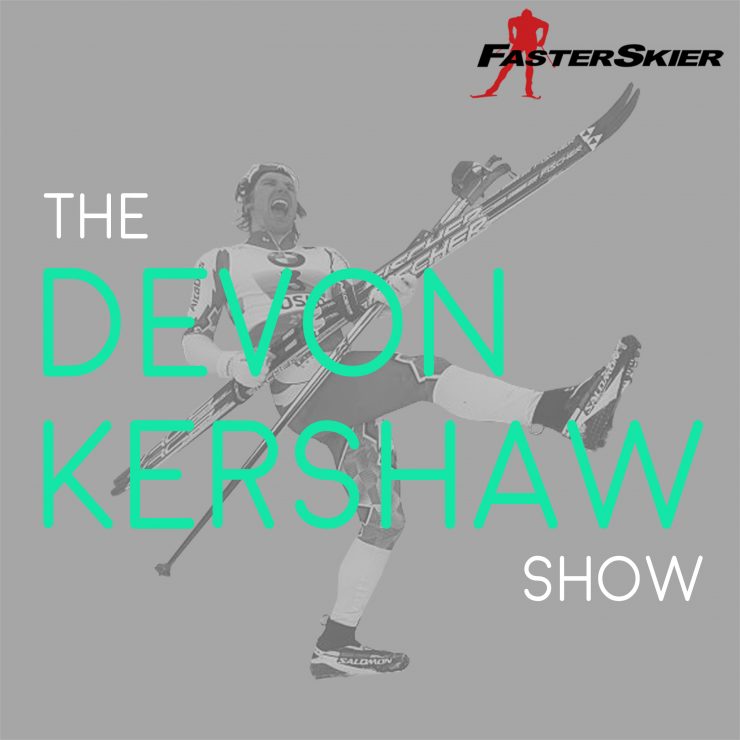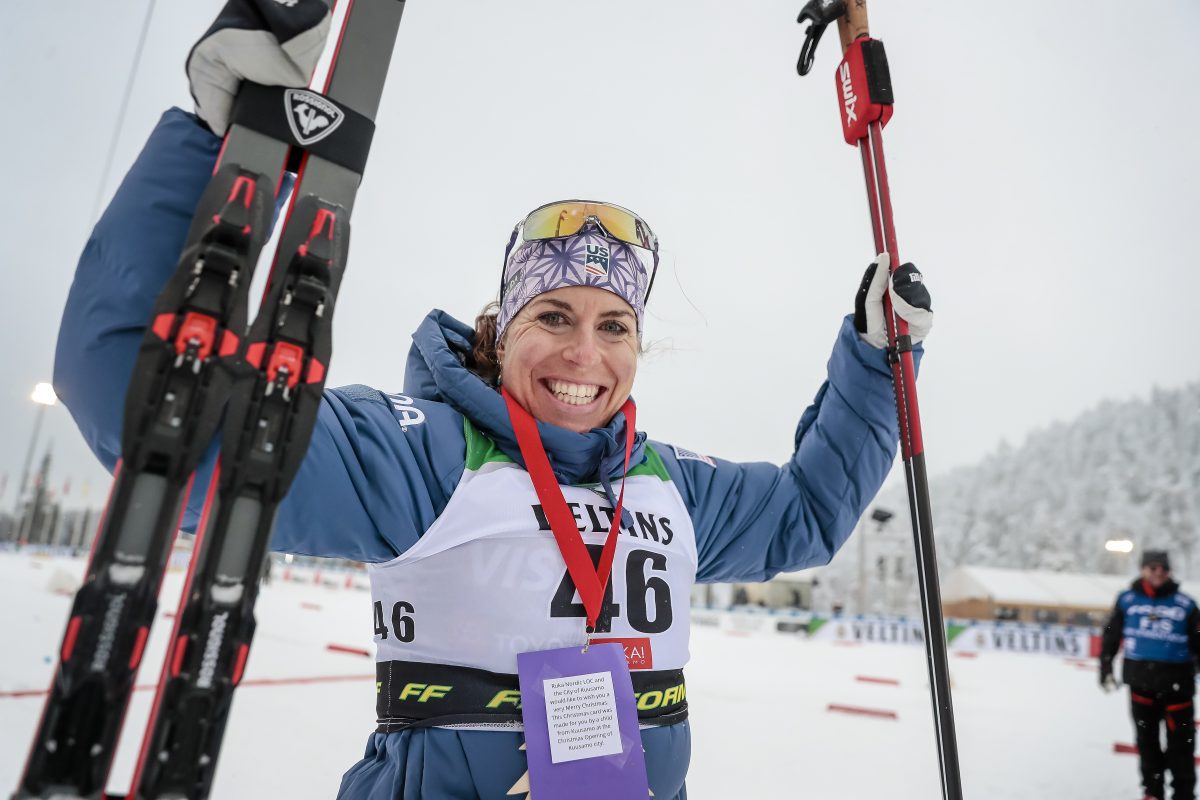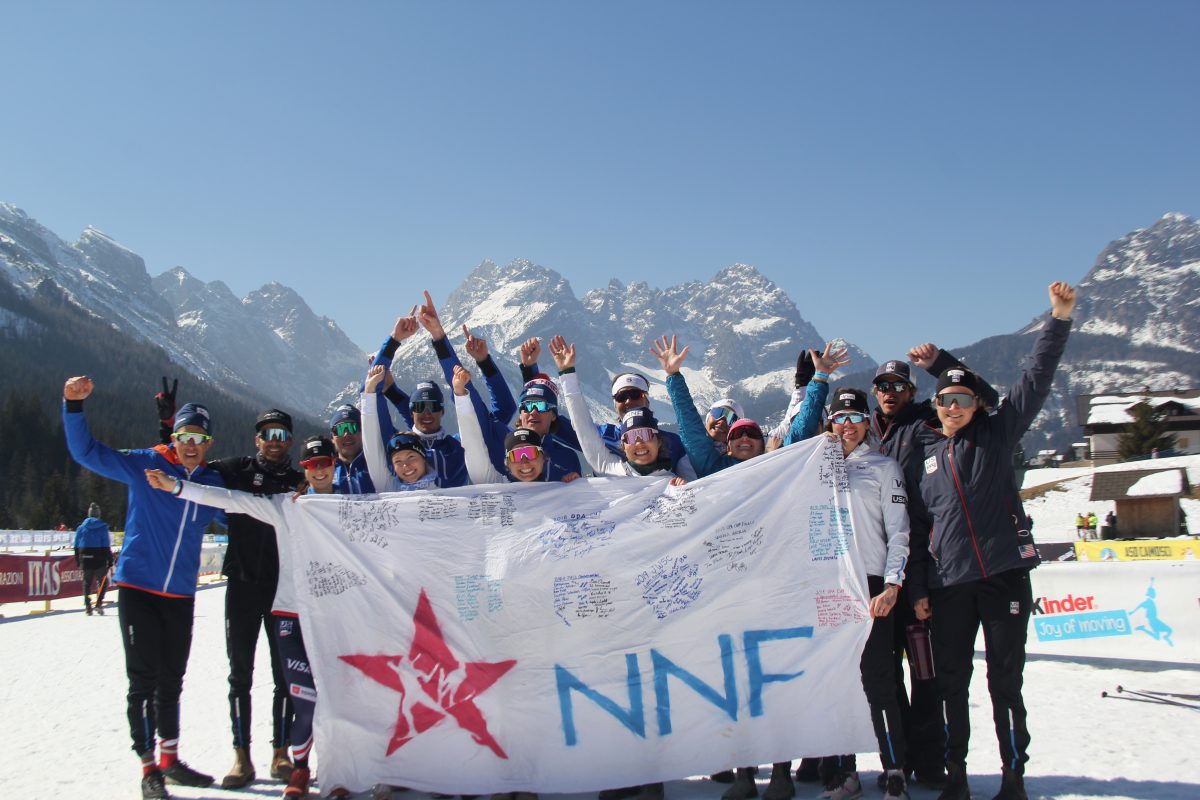
There was no doubt who was the strongest man in Sunday’s 20 k pursuit at the World Junior Championships.
Germany’s Markus Weeger won the race the hard way, attacking halfway through and maintaining a 20-second advantage over a small group of chasers all the way to the line. Russia’s Konstantin Kuleev was second, outsprinting Finland’s Perttu Hyvarinen.
The 19-year-old Weeger, who hails from near Nuremberg but trains in the ski mecca of Oberstdorf, collected his second medal of the championships in Otepaa, Estonia, after winning silver in the 10 k freestyle earlier this week.
“He works very hard,” Markus Cramer, the head German junior coach, told FasterSkier. “I’m not surprised—but I’m surprised for gold.”

In 31st, Canadian Andy Shields was the top North American finisher, moving up seven places from his position at the end of the classic leg. After fighting his way through windblown snow that filled the tracks and challenged all of the men, Shields was in a much better mood at the finish than on Wednesday, when he fell short of his own expectations in the 10 k freestyle.
“Just missed that top 30, which was my goal, but close enough,” he said on Sunday. “It was a little messy, but it was a lot of fun our there.”
Scott Patterson was the top American in 35th. He was in good position early in the classic leg, but he said his skis were a little slick, and by the race’s halfway point, things were going downhill. He hit the exchange sitting in 21st, 35 seconds off the leaders, but really cracked in the skating, dropping another two-and-a-half minutes by the finish.
“Legs were just burning—I just was losing places,” he said.
While Patterson was only ten seconds and four places behind Shields, he had been aiming much higher in Otepaa. He’ll get another shot at the top 10 next year, as he has one more year as a junior; in the mean time, he couldn’t explain why he fell short in Europe this season.
“I just didn’t have it this week—never really felt relaxed,” he said. “I think my fitness is fine—I just couldn’t ski fast.”
Weeger, meanwhile, was moving. Hailing from near Nuremberg—no winter sports hotspot—he moved to the ski Mecca of Oberstdorf some five years ago, according to Cramer. There, he trains with a group that includes national team members Katrin

Zeller and Nicole Fessel.
On Sunday, Cramer said that he had instructed Weeger to wait until the skate leg to make a move, which made sense, given that breaking trail in the windblown classic tracks would have been a lot of work.
The classic course also included a lot of faster, gradual terrain, which would have made it harder to escape, while the skate loop had a number of hard climbs. Weeger attacked the lead group of 10 others at the top of the steepest one, some 13 kilometers into the race. Since he’s not a sprinter, he said the only way he could win was to try a breakaway.
“The coach said I have to taste it,” he said.
Weeger picked a good time to attack—Hyvarinen said that the group was “relaxed” at that point. But, he also added, they didn’t have the energy to chase.
“Everyone thought about silver and bronze—not about gold,” he said.
On the second of three 3.3-kilometer laps, Weeger built up a 25-second advantage, looking relaxed even with the chasers often in sight on Otepaa’s open courses.
By the time he got to the top of the last climb, Weeger said, he knew he had gold in hand, and had time in the stadium to slow down and celebrate all the way down the homestretch.
Behind, things were starting to shake out. Weeger’s teammate Thomas Wick had looked strong, throwing in an attack around 15 k, but the final sprint ended up being a battle between Kuleev, Hyvarinen, and Rok Trsan, a Slovenian who at 18 is a year younger than the three podium finishers.
Trsan got the short end of the stick on Sunday; he was dropped by the other two in the stadium. But his fourth place was a promising sign for the Slovenian men, who have never had results comparable to those of the country’s women’s team.
“In the future, he’ll be like our girls,” Matjaz Gorjanc, one of Trsan’s male teammates, told FasterSkier. “We are coming.”
At the end of the day, though, it was the typical powerhouse nations of Germany, Russia, and Finland each adding to their medal tallies. Norway and Sweden are the only other countries to take podiums in Otepaa, and Sweden has just one.
Norway leads with 13, while Russia has eight, and Germany and Finland four apiece.

Nathaniel Herz
Nat Herz is an Alaska-based journalist who moonlights for FasterSkier as an occasional reporter and podcast host. He was FasterSkier's full-time reporter in 2010 and 2011.




One comment
shreddir
January 31, 2011 at 12:29 am
This report can’t overstate how much Markus Weeger dominated this race during the skate leg. It is a little inaccurate saying he made his move at 13k. You can see he takes off as soon as the group passes under a concrete overpass which was about 2 minutes and 12 seconds after he went through the 11.1 k time check. At that point it’s as if he said “see you chumps at the finish…Later Fools, ha,ha!” After going through the coach zone and chugging some feed he enters the stadium loop and is 13.9 sec ahead of 2nd place Notz. From then on he absolutely hammers. It’s like there’s two separate races: his own private time trial, and everybody else in their intramural flailfest behind him. After he raises his arms and crosses the finish he only has to bend over for a second or two, to catch his breath, and then walks around with his teammates like he just got finished with a routine distance training work-out. Meanwhile most everybody else is on hands and knees or sprawled out in the finish area gasping for air. If this kid can continue to skate this way, I see him as the “anti-Northug”. Get him on a fast, hardpacked course with no wind colliding head to head with Petter?– Maybe it will create a “Black Hole” in the cross-country universe…ha,ha.